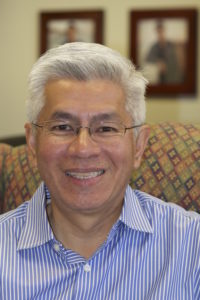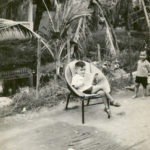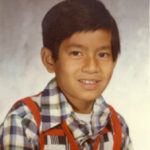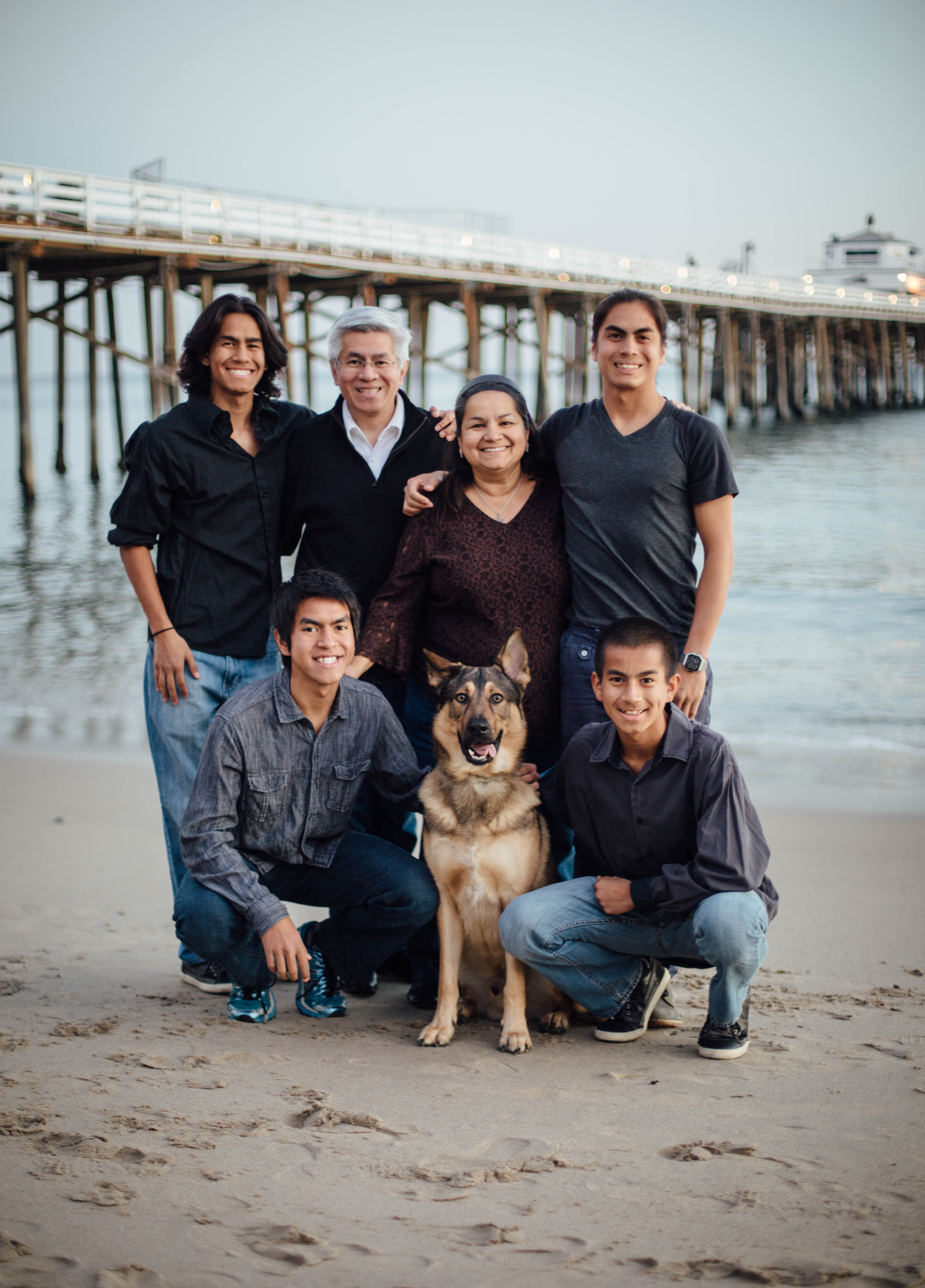
Eleven-year-old Hung Le skipped down the stairs and jumped excitedly into the backseat of Tan Beard’s car and strapped his seatbelt on. As they chatted and drove down the road on their way to the birthday party, their eyes locked in the rearview mirror.
“I still remember the feeling,” he said. “I felt cold and exposed and I realized that I hadn’t put on a long sleeve shirt, I was just wearing my T-shirt. And I usually cover up because the bruises were pretty apparent.”
Le said he tried to explain he had fallen down the stairs. But Beard turned the car around and drove back to his home.
‘Hung, go upstairs,” she said. “Grab as much stuff as you can, you’re not coming back here.’”
University Registrar Hung Le in his office in Pepperdine University’s Thornton Administration Center (Photo by Rachel Littauer).
Le, now 52 and the Pepperdine University registrar, eased into the armchair in his office in Pepperdine University’s Thornton Administration Center across from the plush green couch worn with the presence of past visitors. Photos of his sons and family covered the walls of his mildly cluttered but homey office. Sunlight flooded into the room via a large window.
Le’s career with Pepperdine has been a long and formative journey. Having attended Pepperdine as an undergraduate, he started working in the Office of Campus Life, now known as Student Activities, back in 1990. Then, he was largely in charge of convocation, as well as student life events such as graduation.
He became the director of Student Accounts in 1998, and formulated the idea for One Stop, Pepperdine’s student advising program, which opened in fall 2000. Some 26 years-later, Le said he has no plans to leave.
“I’m a lifer,” he said with a chuckle. “I love this place. You know, this is my family. I don’t see it as just an institution, this really is my family.”
Le met his wife Corinne during his undergraduate time at Pepperdine, and they have four sons, 21-year-old Zach, 19-year-old Ben, 17-year-old Jaime and 15-year-old Garrett.
For Le, family is everything.
From Vietnam to the U.S.
Le fled Vietnam with his cousin in 1975, right before the fall of Saigon. As an employee of the U.S. Embassy, Le’s cousin was given tickets for himself and his family to leave Vietnam — a U.S. effort to evacuate the Vietnamese nationals who worked for them.
Le’s oldest brother died in 1974, thus leaving him — at the age of 11 — with the responsibility to carry on the family name in America. His family sold all of their saleable possessions and gave the money to Le’s cousin to compensate him for taking their son to the U.S. Le, his cousin, and his cousin’s family traveled through several refugee camps in the Philippines, Honolulu and San Francisco.
Upon arrival in Honolulu, Le’s cousin got word that their sponsor, an uncle who lived in Michigan, could no longer support their travel so they rerouted to live with a Vietnamese woman in Seattle. Le later found out that his cousin had promised her that he would also bring her daughter over when he came, but he had brought Le instead when he had found the better financial deal.
Despite this deception, she offered to house Le for a few months while his cousin and their family found housing elsewhere. But after a short while, his cousin came back for him. He was applying for Section 8 subsidized government housing and needed another family member to live with him in order to get the deal, so he took Le back.
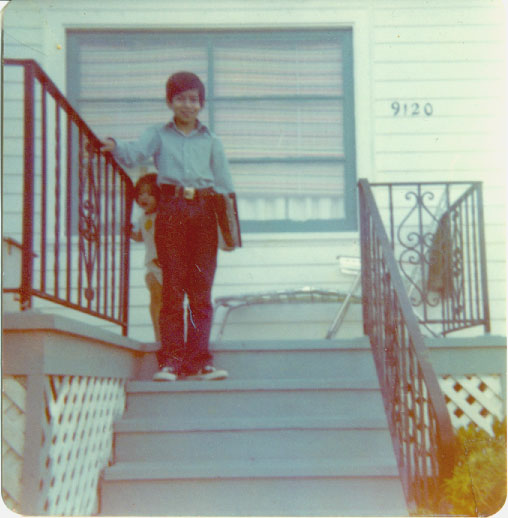
The two lived together for about a year, despite his cousin’s heavy physical abuse. Le said he took the beatings because he was deathly afraid of his cousin and his threats to send him back to Vietnam if he did not behave. After his removal from his cousin’s home in 1975, Le entered the foster care system in King County, Washington. He recalled standing in front of the judge and being questioned.
“In the end, I remember he said, ‘you are now a ward of the state.’ That was the first time I had ever heard that phrase — ward of the state,” Le said. “I didn’t know what that meant. But that was when they allowed me to be in the foster care system.”
Foster care
Le’s first foster family was the Beards, a family he described as generous, loving, kind and the sort of family anyone would want to be a part of. The Beards discussed adoption with Le and he heartily agreed, until he remembered his duty to maintain his family name. Le recalled hugging his foster father and weeping, telling him how much he wanted to be his son, but couldn’t change his name.
“And I remember him just hugging me and he said, ‘You know Hung, you’re my son, whether the paper says it or not — you’re my son,’” Le said, tears filling his eyes.
After living a few years with the Beards, Le, as a sophomore in high school, left to move in with the Rathbun family, a change he attributed to stressful teenage years. He remained in the King County foster care system throughout high school and despite living with two loving families, he recalled a continuous sense of impermanence.
“As much as they love me, I always knew, in the back of my mind that they could send me back anytime,” he said. “You’re there temporarily, you’re a ward of the state, you belong to the state, you’re the son or the daughter of the state you’re not the son or daughter of the family with whom you’re staying.”
Family and faith
Le was incredibly close with his oldest sister, Tuyet, during his time in foster care, and the two wrote letters back and forth from Washington to Vietnam.
Le remembers writing to tell his sister about everything, from the tiny minutia of his day to their long-term plans to live together after they were reunited in the U.S. Le kept all of his sister’s letters and still has them now.
Shortly after moving in with the Rathbun family, however, Le received word that Tuyet had escaped Vietnam and was living as one of the boat people, a term used to describe refugees fleeing Vietnam after the war and living on the high seas for an extended period of time. Le found out that Tuyet’s boat had run out of water, and someone gave her water to drink without realizing it was water from the engine. The water was tainted with acid and ate through her stomach lining, eventually leading to her death, Le said.
Following the news, Le sunk into what he thought was just a funk, but now recognizes as a serious depression. He remembers the night he received word and just sobbing until every part of his being hurt.
“I remember I touched my head and my hair hurt, every part of me hurt,” he said.
From that extreme grief, Le recalled becoming very angry at the situation.
“I was angry with my parents for letting her escape,” Le said. “I was angry with the communist government for creating such an oppressive environment that she had to escape. I was angry with her for dying, I was angry with myself because somehow I had caused this — but most of all I was angry with God.”
Raised as a strong Roman Catholic, Le said he had a very transactional concept of God, doing good whenever he could and being very obedient. Following his sister’s death, however, Le refused to believe anymore and remembered turning away from faith. Eventually, his high school friend Craig approached him and asked him why he had withdrawn from everything, and why he was acting so differently.
“As I talked to him I realized that the most painful thing during this two-month period was that I knew in my heart of hearts that God was still alive, and that my sister was still dead,” Le said. “And that just killed me.”
Le recalled chatting with Craig and being profoundly impacted when Craig said, “You know Hung, if you believe in God, which I believe you still do, you’ve got to believe that he works on his timeline and not yours.”
That night Le went home to his room and cried for the first time since he had initially heard word of his sister’s death. He remembered feeling like something broke inside of him and he began a new relationship with God that was far more personal — a major turning point in his faith journey. Le now attends the University Church of Christ on Pepperdine’s campus.
“My faith is who I am, and it forms who I am and permeates every part of my life,” he said.
Incorrigible delinquent
In high school, Le was allowed access to his state files, and found that he had been labeled as an “incorrigible delinquent” by the state. Infuriated by the inaccurate representation, Le called the department and asked them to change it.
He recalled them saying,“It doesn’t matter, it’s OK, we just had to put you in some category.”
Le, a straight-A student and all-around good kid, was still not satisfied with the label and his principal, teacher and friends wrote letters to his social worker stating just how inaccurate the label was. In response, authorities added a memo to the file and removed the label. One of the biggest misconceptions about foster kids is that they are incorrigible delinquents, Le said. Somehow they become “less than.”
“If all you have is the files and all you read is the labels you put on kids, that’s how you treat them and then you turn them into their labels,” he said.
Getting to Pepperdine
Le was reluctant to attend Pepperdine as he was convinced he didn’t want to live in Southern California. His high school guidance counsellor, Kay Keyes, convinced him to at least apply to Pepperdine, as she thought it would be a good fit for him.
Le said he applied simply out of respect for Keyes, and attended the admitted students reception near the airport in Seattle. He distinctly remembered the dean of Admission saying that tuition was going to be $11,000 a year, and he laughed all the way home, knowing he wouldn’t be able to afford that.
A few weeks later, Le received an award letter from Pepperdine offering to pay for almost all of the tuition except for an expected family contribution of $2,500.
“You might have said $2 million,” Le said with a laugh. “I didn’t have that.”
Le had decided to go to Seattle Pacific University, but a letter from the dean of Admission ultimately changed his mind. In the letter was a sentence that read, “We are committed to helping you achieve your academic endeavors at Pepperdine,” Le recalled.
After reading that, and truly believing that Pepperdine was interested in his specific ability to succeed, he decided to attend. Le worked all summer long, took double shifts and arrived at Pepperdine with barely enough. He attributed the rest of the funds to God’s provision.
Le turned 18 in March of his senior year of high school. Technically, that meant the end of his legal time in foster care, but he was able to live with the Rathbuns until he arrived at Pepperdine in the fall of 1983. Although his relationship with the Rathbuns was still positive, he had to take all of his worldly possessions with him, because their home was no longer his.
“I came to Pepperdine starting a brand new life,” Le said. “I had all of my worldly possessions with me, it wasn’t a lot but I didn’t have anything to go home to.”
Whatever he didn’t take with him was discarded, including a large picture of him and his marching band from high school. He recalled chatting with his admission counsellor before arriving and focusing the entirety of the conversation on shipping details of getting his belongings to school.
Still, arriving on campus and knowing where he was going to be for four whole years was profound for Le. Le recalled being a freshman at Pepperdine University and spending a Friday night writing a letter to his high school English teacher, Cay Bennett.
“I remember telling her, ‘Mrs. Bennett, I have such incredible peace right now. For the next four years I know where I’m going to be, and I get to determine whether I stay, or not,’ ” Le said.
Le spent his first Christmas break back in Seattle, house sitting for his high school world history teacher, Darlene Sherrick, while she traveled Spain. Le also visited with Bennett who he said was his most favorite teacher and like a mom to him while he was in high school. Le is still in touch with Bennett, now in her 90s.
Le lived at Pepperdine for the rest of his college career, spending summers with faculty families or President David Davenport at the Brock House. Le and other students used to bring dinner once a month to Helen Pepperdine, and listen to her stories.
Le and Corinne (front right) with Helen Pepperdine, featured in the middle, during one of their monthly dinners with her in 1986 (Photo courtesy of Hung Le).
“It was much less about me than the grace of God that allowed me to be here, to find a place like Pepperdine where I was absolutely loved and cared for as a son,” Le said.
Meeting Corinne
Le studied in Heidelberg, Germany, where he met his future wife, then Corinne Sanchez. Although they fondly disagree about how many times they spoke while abroad, Le remembers first meeting her at the castle in Heidelberg. The two started dating when they returned from overseas and Le proposed at the Pepperdine Theme Tower two years after their graduation in 1987.
“She still is my very best friend,” Le said, his eyes crinkling into a soft smile.
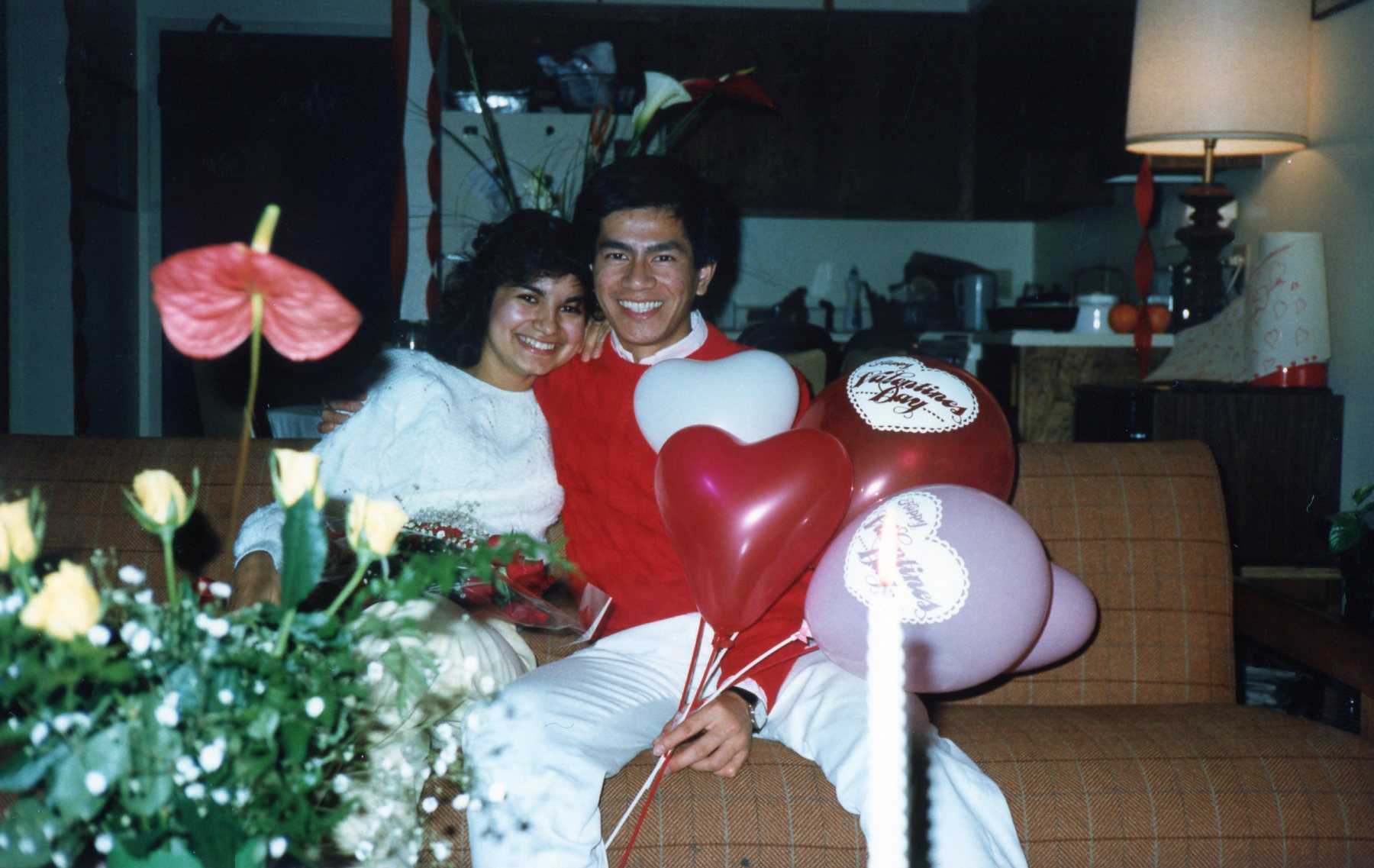
During the engagement, Le worked in New York on an out-of-town assignment for a consulting firm, and the two maintained a long-distance relationship, seeing each other about every other weekend. While in New York, Le recalled receiving a suggestion from Tan Beard to call his cousin and invite him to the wedding. Although hesitant, he took her suggestion to not let his cousin have that power over him, and decided to at least call him.
Within minutes he remembers his cousin saying that he forgave him for being such a bad kid and for needing to be beaten so much. Le recalled hanging up and visibly shaking from the call. He called Bennett, and broke into sobs upon hearing her voice.
After he finally got the story out, he distinctly remembered her saying, “Hung he is an ass. You are done with him, it was not your fault that you got beaten, no one deserves to be beaten. It’s not your fault.”
Le recalled the incident vividly, expressing the intensity of the emotion he felt in speaking with his cousin and hearing those words. It took a long time to get over the shame he felt with being abused, and despite viewing himself as a well-adjusted person, he struggled with even admitting that he had been maltreated.
Forming community with people at his high school and Pepperdine University was instrumental to his growth, not the actual foster care system, Le said.
After returning to LA, Le married Corinne in Pepperdine’s Stauffer Chapel. President Davenport officiated, with the reception at Brock House. Following their wedding, one of Le’s adopted mom’s, Nancy O’Neil, came out to their car and said, “OK, you guys better make this thing stick because if you don’t you have 150 families to answer to.”
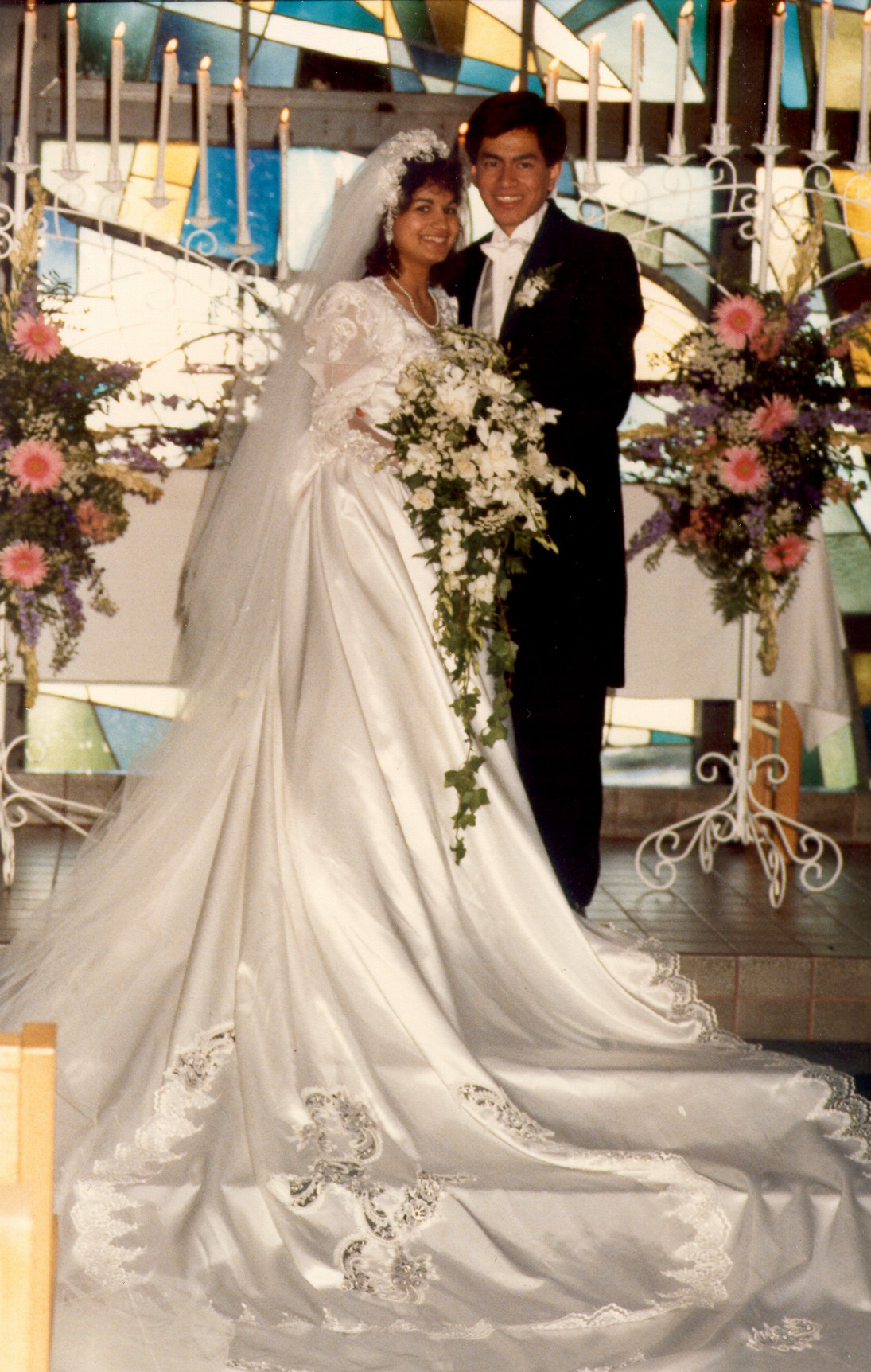
Reunited with family
Hung and Corinne Le moved to New York, where Le worked at a consulting firm and the two lived on Long Island. They moved back to LA in 1990, when he got word that his family in Vietnam had finally gotten approved to immigrate to the United States. It had been 15 years since he had seen them.
About a week before his family was about to come over, Le received word that they had been delayed — for an entire year. The family spent time at refugee camps in Thailand and the Philippines and finally came to the United States in 1991, where they were reunited after 16 years of separation.
Le has remained close with his parents who now live in the San Fernando Valley, as well as brothers and sisters who live mostly in California. Le still has some extended family in Vietnam.
Parenthood
For Le, faith is the center of his life and has impacted the way he lives and parents. Corinne gave birth to their first son in 1995, a memory that strongly stands out to Le.
“I will always remember the first time I held Zach in my arms,” Le said. “It was the most incredible feeling and I’ll always remember the first thought that came across my mind was, ‘I would give my life for him.’ ”
As Le reflected back on that later he realized that he had never really had that thought for any other human being. Although he said he would give his life for Corinne, he had never thought of it in the same way he did with Zach.
“This baby in my arms was a completely different feeling,” he said. “I remember thinking, I wonder if this is just a glimpse of what God felt like when he sent Jesus.”
Le is strongly committed to wholeness as a family with each of his sons, and wants them to feel the permanency of their family unity. His own memory of impermanence and the feeling of not knowing where he would be at a given time, has greatly impacted his commitment to showing his children unconditional love.
“I mean I could be irritated with them, I could be angry with them, I could be happy with them, I can be proud of them,” he said. “But that doesn’t change my commitment to them. We’re in it for life.”
Coming to Pepperdine gave Le a family, and helped him build one of his own.
He believes foster kids need community most of all, whether that comes from the church, local community or school, Le said. For him, school was always a place where he felt safe.
“When we talk about it takes a village to raise a child, I think so often, the village for the foster child consists of the foster family and the agency,” Le said, “and I think we need to really focus on the whole village — the greater village.”
For Le, his loving foster parents and the Pepperdine community were really the greater village that raised him.
“It turned out to be a real blessing because I had to choose to make this my family, and it did,” Le said. “I can’t find another human being who had a better college experience than I. Honestly, because this was not just my school, this was my home, this was my family.”
Rachel Littauer completed this story in Dr. Christina Littlefield’s fall 2016 Jour 590, investigative and narrative reporting class.

